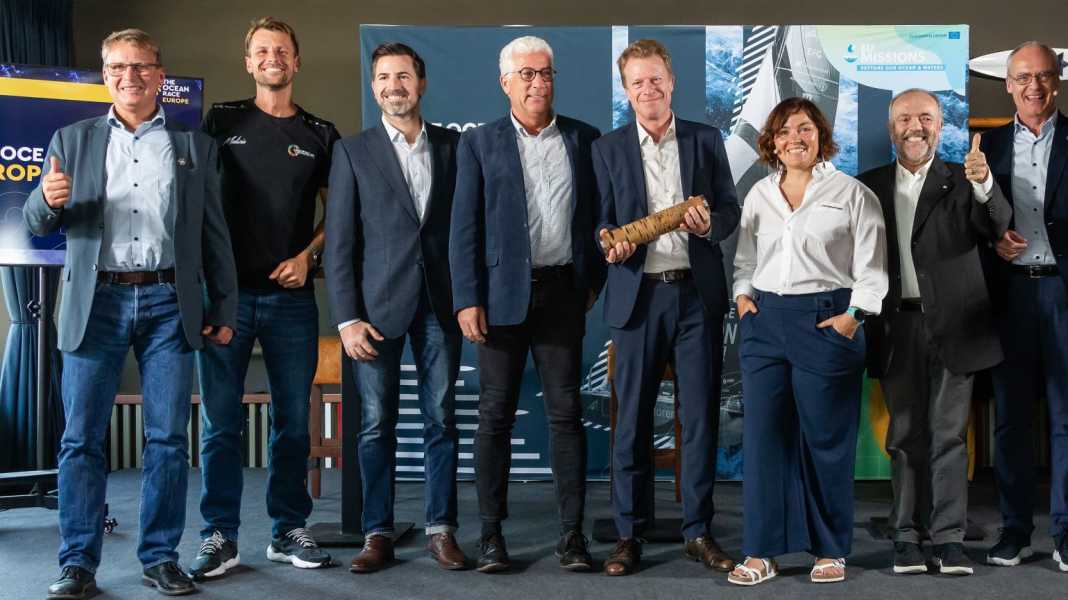The Ocean Race Europe: All regatta yachts become marine conservation data collectors
YACHT-Redaktion
· 19.09.2024

At a kick-off event for The Ocean Race Europe in Kiel, Lord Mayor Dr Ulf Kämpfer emphasised that the combination of sailing and water sports as well as scientific campaigns for marine conservation raises awareness among all water sports enthusiasts, especially young people.
"Through sailing, we can raise people's awareness of the problems facing the world's oceans and inspire them to support conservation programmes," said Kämpfer. "The ocean heroes are role models, especially for the younger generation, who are particularly concerned about a clean environment now and for the future."
The plastic pirates, in which young people take water samples, were cited as examples of activities in which sailors are already participating. In addition, 'Sailing for Oxygen', in which recreational skippers use a probe on a fishing rod to measure oxygen and salt content, temperature and pressure in the depths.
Also interesting:
Regatta yachts as data collectors
The regatta professionals are also important aids. For example, the Geomar Institute in Kiel has a collaboration with Boris Herrmann and his Malizia team. The so-called "Ocean Pack" was used to collect data from regattas all over the world. Now all Imoca yachts taking part in the race will be equipped with such a pack and will measure CO2 levels and other ocean parameters, among other things.
"In the meantime, the active organisms are providing valuable insights for science," said Dr Toste Tanhua, a scientist at the Geomar Institute for Marine Research and Oceanography in Kiel.
Recreational sailors are involved
Under his leadership, a version of an "Ocean Pack" for everyman yachts is also being developed. This should provide even better insights and more comprehensive data on the oceans, where there are otherwise only a few measuring stations. The results will flow into international networks and thus promote scientific research into the oceans.
In addition to the partnership with Boris Herrmann, Kiel is heading towards a climate-neutral future with several sustainable projects. Dr Kämpfer emphasised the electrification of the cruise terminal, the introduction of electric ferries and a marine visualisation centre, which is to be completed in the next five to seven years and is intended to promote marine conservation and an understanding of the oceans.
About The Ocean Race
Originally launched in 1973 as the Whitbread Round the World Race, The Ocean Race has been the ultimate ocean test for teams ever since. First held as the Volvo Ocean Race in 2001-02, the Leverkusen-based "illbruck Challenge" was the first and only German yacht to win the race with a breathtaking finish in Kiel. The 14th edition of The Ocean Race, celebrating its 50th anniversary, started on 15 January 2023 in Alicante, Spain, and ended on 1 July with the grand finale in Genoa, Italy. The field visited nine cities around the globe, including Kiel with a fly-by. The race, which was contested for the first time with flying (foiling) IMOCA boats, was won by the US American 11th Hour Racing Team, narrowly ahead of Hamburg ocean sailor Boris Herrmann's Team Malizia.
In addition to the "Round the World" race, the organisers have established two other race formats in the meantime: On 10 August 2025, The Ocean Race Europe will start in Kiel from the Baltic Sea across the Atlantic to the Mediterranean, for which Team Malizia has already entered. The first edition of The Ocean Race Atlantic will sail from New York to Barcelona in autumn 2026, before the next circumnavigation starts again in Alicante in January 2027.
